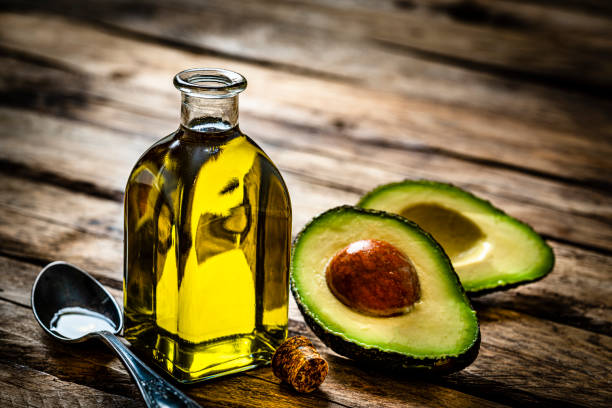In recent years, avocado oil has become a celebrated staple in many kitchens and beauty regimes. Extracted from the creamy flesh of avocados, this oil is lauded for its health benefits and versatile uses. But what exactly makes avocado oil a superior choice among its counterparts? This article will delve into the various facets of avocado oil, exploring its nutritional profile, culinary uses, benefits for skin and hair, comparisons with other oils, and its environmental impact to provide a comprehensive understanding of this green-hued elixir.
Nutritional Profile and Health Benefits
A treasure trove of nutrients, avocado oil is predominantly composed of heart-healthy monounsaturated fats, specifically oleic acid. With a beneficial omega-6 to omega-3 ratio, it supports cardiovascular health and helps reduce inflammation. Vitamins like E and K are abundant, contributing to its antioxidant properties and promoting healthy skin and eyes. Additionally, avocado oil is rich in lutein, an antioxidant that’s crucial for eye health. The breakdown goes as follows:
- Monounsaturated Fats: Improve heart health and cholesterol levels.
- Vitamin E: An antioxidant that combats oxidative stress and bolsters skin health.
- Vitamin K: Essential for blood clotting and bone metabolism.
- Lutein: Supports eye health by reducing the risk of macular degeneration and cataracts.
Moreover, its high smoke point makes it a safe and robust option for various cooking methods, retaining its nutritional value even when heated.
Exploring Culinary Uses
Avocado oil’s buttery flavor and high smoke point (around 520°F) make it an excellent choice for a multitude of culinary applications. Not only can it be used for sautéing, grilling, and searing without the risk of burning, but it also serves as a delicious base for salad dressings and marinades. Its subtle taste doesn’t overpower dishes, making it a favorite for drizzling over finished plates for added richness. Considered a staple in the health-conscious cook’s pantry, avocado oil can replace less healthy fats without compromising taste or versatility. A versatile performer in the kitchen, here’s how avocado oil stands out:
- Excellent for high-heat cooking due to its high smoke point.
- Mild, creamy flavor that enhances rather than competes with the main ingredients.
- Perfect for homemade mayonnaise, aiolis, or as an emulsifier in salad dressings.
- Can serve as a healthier substitute for butter or margarine in baking.
Benefits for Skin and Hair
The hydrating and nourishing properties of avocado oil make it a valuable component in skin and hair care routines. Its rapid absorption into the skin provides deep moisturizing effects while stimulating collagen production, which is key to maintaining skin’s elasticity and suppleness. Avocado oil is suitable for sensitive skin, often used to calm itchy skin, heal chapped skin, replenish dry skin, and shield the skin from ultraviolet radiation. As for hair, massaging avocado oil into your scalp can stimulate blood flow and unclog blocked follicles, potentially staving off hair loss. The oil also serves as a natural detangler and can shield hair from damage caused by the environment and styling.
- Moisturizes and nourishes the skin.
- Promotes collagen synthesis improving skin elasticity.
- Can help reduce symptoms of psoriasis and other skin irritations.
- Promotes a healthy scalp and aids in preventing hair loss.
- Acts as a natural SPF and protects hair from environmental damage.

Comparison with Other Oils
When pitted against other oils like olive oil or coconut oil, avocado oil holds its own with unique qualities. Its unparalleled high smoke point surpasses most oils, making it less prone to oxidizing and breaking down at high temperatures, thus retaining more of its nutritional value during cooking. While olive oil also boasts a rich composition of monounsaturated fats, avocado oil tends to have a milder taste that’s more adaptable in various recipes. Coconut oil, on the other hand, is higher in saturated fat and imparts a distinct flavor that might not be suitable for all dishes. Here’s how avocado oil compares:
- Higher smoke point than olive and coconut oils, reducing potential for oxidation.
- Richer in vitamin E and monounsaturated fats than many vegetable and seed oils.
- Milder flavor, offering more versatility in cooking than coconut oil’s pronounced taste.
- Less oily residue when used topically compared to heavier oils, perfect for skin and hair treatments.
Environmental Impact and Sustainability
The rise in demand for avocados, and consequently avocado oil, has brought attention to the environmental considerations of its production. Growing avocados requires significant water, which, in drought-prone regions, can be unsustainable. It’s important for consumers to seek out brands that prioritize sustainable farming practices to mitigate these impacts. Environmentally conscious production includes water conservation methods, ethical labor practices, and responsible pest management. Nonetheless, when compared to animal-derived fats (like butter) or crops that demand heavy pesticide use, avocado oil can be a more eco-friendly option given the proper environmental safeguards.
- Requires significant amounts of water, which may contribute to water scarcity issues.
- Choosing responsibly farmed avocado oil is critical to minimizing environmental impact.
- More sustainable than some animal-derived fats and heavily pesticided crops when sourced conscientiously.
Conclusion
Avocado oil presents a plethora of benefits, from its high nutrient content and cooking versatility to its positive effects on skin and hair health. When selecting avocado oil, consider not only its culinary and health attributes but also the sustainability of its production. Understanding the broader impact of our ingredient choices leads to not only better health outcomes but also more informed and responsible consumption. As we’ve explored, avocado oil’s distinctive qualities undoubtedly make it a valuable addition to any pantry or beauty regimen, with the added bonus of having the potential to support ethical and environmentally friendly practices in its sourcing.
FAQs
What is the shelf life of avocado oil, and how should it be stored?
Avocado oil typically has a shelf life of up to 12 months when stored in a cool, dark place. Keep the bottle sealed tightly and away from direct sunlight to maintain its quality and freshness.
Can avocado oil be used for frying?
Yes, avocado oil’s high smoke point makes it ideal for frying, as it remains stable and doesn’t break down easily at high temperatures, unlike many other oils.
Is avocado oil healthier than olive oil?
While both oils are healthy, avocado oil has a higher smoke point and is richer in vitamin E, making it a slightly better option for cooking at high temperatures and for skin care.
Can avocado oil help with weight loss?
When consumed as part of a balanced diet, the monounsaturated fats in avocado oil can help in weight management, but no single food or oil can be solely responsible for weight loss.
Is avocado oil environmentally friendly?
The environmental friendliness of avocado oil depends on the sourcing and farming practices employed. Choosing sustainably sourced avocado oil is key to reducing its environmental impact.



